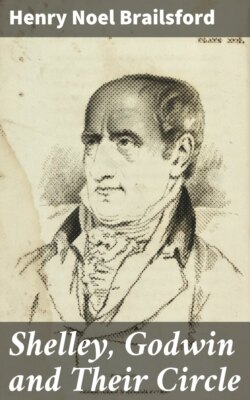Shelley, Godwin and Their Circle

Реклама. ООО «ЛитРес», ИНН: 7719571260.
Оглавление
Henry Noel Brailsford. Shelley, Godwin and Their Circle
Shelley, Godwin and Their Circle
Table of Contents
CHAPTER I
THE FRENCH REVOLUTION IN ENGLAND
CHAPTER II
THOMAS PAINE
CHAPTER III
WILLIAM GODWIN AND THE REVOLUTION
CHAPTER IV
"POLITICAL JUSTICE"
CHAPTER V
GODWIN AND THE REACTION
CHAPTER VI
GODWIN AND SHELLEY
CHAPTER VII
MARY WOLLSTONECRAFT
CHAPTER VIII
SHELLEY
BIBLIOGRAPHY
POSTSCRIPT, 1942
INDEX
Отрывок из книги
Henry Noel Brailsford
Published by Good Press, 2021
.....
The key to any understanding of the dialogue between Burke and the Revolutionists is that each side was moved by a passion which meant nothing to the other. Burke was hoarse with anger and fear at the excesses in France. They were afire with an almost religious faith in human perfectibility. Burke's is a great record of detailed reforms achieved or advocated, but for organic change there was no place in his system, and he indulged in no vision of human progress. "The only moral trust with any certainty in our hands," he wrote, "is the care of our own time." It was of to-morrow that the Revolution thought, and even of the day after to-morrow. Nothing could shake its faith. Proscribed amid the Terror for his moderation and independence, learning daily in the garret where he hid of the violent deaths of friends and comrades, witnessing, as it must have seemed to him, the ruin of his work and the frustration of his brightest hopes, Condorcet, solitary and disguised, sat down to write that sketch of human destinies which is, perhaps, the most confident statement of a reasoned optimism in European literature. He finished his Sketch for an Historical Picture of the Progress of the Human Mind, left his garret, and went out to meet his death. A year later, as if to show that the great prodigal hope could survive the brain that conceived it, the representatives of the French people had it circulated as a national document.
It would be a fascinating but too protracted study to follow this faith in the perfectibility of mankind to its final enthusiasms of prophecy, and to trace it to its origins in the speculations of Helvétius and Holbach, of Priestley and Price. It was a creative impulse which made for itself a psychology and a sociology; it rather led the thinking of men than followed from their reasonings. They seem at every turn to choose of two alternative views the one which would favour this sovereign hope. Is it reason and opinion, or some innate character which governs the actions of men? The philosophers of hope answer "opinion," for opinion can be indefinitely changed and led from prejudice to science. Is it climate (as Montesquieu had urged) or political institutions which differentiate the races of men? Clearly it is institutions, for if it were climate there would be nothing to hope from reform. Burke opposed to all their schemes of construction and destruction, to their generalisations and philosophisings, the unchangeable fact of human nature. They answered (diving into Helvétius) that human nature is itself the product of "education" or, as we should call it, "environment." Circumstances and above all political institutions have made man what he is. Princes, as Holbach puts it, are gardeners who can by varying systems of cultivation alter the character of men as they would alter the form of trees. Change the institutions and you will change human nature itself. There seemed no limit to the improvement which would follow if we could but discard the fetters of prejudice and despotism.
.....